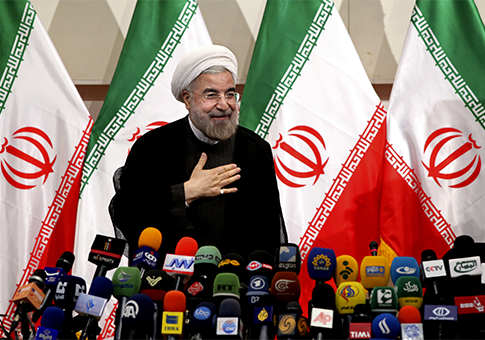Iranian experts told Congress that Iran’s President-elect Hassan Rowhani is no reformer, but were divided on whether his election is a sign that the regime is willing to soften its nuclear stance during a hearing before the House Subcommittee on Middle East and North Africa on Tuesday.
Rowhani has been portrayed as a moderate reformer by the media and some Iranian regime supporters, despite his close relationship with Iran’s Supreme Leader Ali Khamenei. Rowhani also supported deadly crackdowns on student protesters in 1999, and claimed that he deceived the West into allowing Iran’s nuclear program to progress while serving as Iran’s nuclear negotiator with the Europeans.
"Hassan Rowhani is no Nelson Mandela. He’s not even Mohammed Khatami," said Karim Sadjadpour, a Carnegie Endowment for International Peace senior associate. "He is a consummate regime insider."
Alireza Nader, senior international policy analyst at RAND Corporation, said it is unlikely Rowhani will help usher in democratic or human rights reforms in Iran.
"It’s true (that) Rowhani’s not a reformer," Nader said. "His goal is not really to change Iran domestically, as much as it is to relieve Iran’s external pressure."
Nader said Rowhani’s election was a sign that "U.S. pressure against Iran is beginning to pay off," by increasing Iranian public support for a candidate who could negotiate with the West on nuclear issues more effectively than President Mahmoud Ahmadinejad.
"Rowhani comes from the tradition in Iran of the pragmatic conservatives," said Sadjadpour. "They believe in order to preserve the regime, Iran needs to privilege economic expediency over [the regime’s] ideology."
Rep. Ted Deutch (D., Fla.) asked whether Rowhani’s election was an attempt by Iran’s Supreme Leader "to undermine the united international coalition against Iran’s nuclear program that currently exists."
"Will countries like Russia and China, for example, be able to accept a deal under Rowhani that they wouldn’t accept under Ahmadinejad?" Deutch asked. "What if [the Iranians] offer less, but it comes without the venom that came with Ahmadinejad?"
Sadjadpour said this was possible.
"The role Ahmadinejad played in uniting the international community against Iran, Rowhani is now creating potential fissures," he said.
Nader said it was unlikely that there would be any meaningful reduction of sanctions without meaningful concessions from Iran.
Suzanne Maloney, senior fellow at the Saban Center for Middle East Policy, said she did not believe Rowhani was there to be "a patsy or a dupe" for the Supreme Leader, but noted that the Europeans "found him frustrating" when he served as Iran’s nuclear negotiator.
